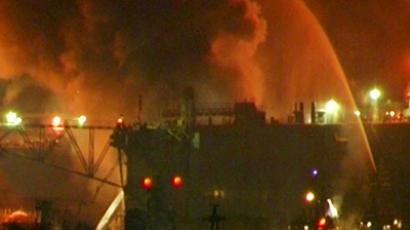Armageddon averted? Nukes 'on board' blazing sub (VIDEO)
There are claims in the Russian media; the country was within a hair’s breadth of a disaster comparable to Chernobyl a few weeks ago. It is alleged a strategic missile-carrying sub was on fire for more than a day with its entire arsenal aboard.
According to Kommersant-Vlast magazine the submarine K-84 ‘Ekaterinburg’ was undergoing minor repairs when it caught fire on December 29 during routine maintenance at a dry dock in Murmansk in Northern Russia. The missiles had not been offloaded as the repairs were regarded as minor, and the sub was due to return to service early in 2012. The magazine claims the scale of emergency has been downplayed.
Equipment on the K-84
The standard arsenal of the K-84 is 16 intercontinental ballistic Sineva missiles with four thermonuclear warheads on each one of them. Every missile is also a tank filled up with highly toxic and combustible fuel. A missile weighs about 80 tons and most of that is fuel. The submarine is also armed with up to 12 torpedoes and anti-submarine missiles, with about 300 kilograms of high-power military explosive or a nuclear warhead on every one.On top of that the sub is powered by two 90 megawatt water-cooled nuclear reactors each containing about 70 kilograms of uranium-235. The reactors were stopped for the time of the repair but the fission materials remained on board at the time of the alleged accident.The “Ekaterinburg” had a busy year in 2011, performing three missile tests, including the launch of a new deeply modernized missile Liner. In late August or early September the sub damaged its nose section, (the reason has never been made public) and was brought to Murmansk for a repair.
The fire on board a nuclear sub
It’s alleged the fire started in the bow of the boat at 15:45 on December 29 during welding. The reports suggest timber scThe aftermath of a blazeaffolding which is prohibited from use for such work caught fire along with the special rubber hydro-acoustic coating inside and outside of the sub. The fire spread rapidly into the hard to reach space between the thin outer hull and the hardened pressure vessel. It took the efforts of over 400 fire fighters with 72 vehicles, including specialist units for fighting heavy industrial fires, to bring the blaze under control by 18.20 on December 30.Kommersant-Vlast insists the fire was raging just meters from torpedoes and nuclear missiles which – if detonated – could have destroyed the submarine and the reactors on board. If such nightmare had happened, the magazine speculates, the nuclear fall out would have covered three nearby towns with a population of 350,000.The Russian Navy stated immediately after the incident that no weapons were on board of K-84 at the time of the incident and that the background radiation in the dock after the fire remained unchanged.Nine people were treated in hospital following the incident, seven crew members and two fire fighters. Most of them were treated for smoke inhalation and some for minor burns.The magazine alleges the consequences of the fire could have been disastrous. It argues, if the missiles blew up, it would have killed everyone close by and required the evacuation from the area of hundreds of thousands of people in conditions of a polar night. The environmental damage could also be considerable, says Kommersant-Vlast.
Russia’s nukes and international obligations
The allegation in the magazine has raised concerns among Russian military experts.Viktor Litovkin, editor-in-chief of the Independent Military Review, seriously doubts a nuclear sub could undergo maintenance with missiles and torpedoes on board. He called the allegations by Kommersant-Vlast “wild”, because an ‘off-duty’ submarine cannot have any weapons on board due to the Russian-American Prague agreement on nuclear arms.“When such a submarine is in dock, all missile pits are opened so that the Americans could check from surveillance satellites that there are no missiles in them,” Litovkin explained.He said Moscow and Washington notify each other when nuclear missile carriers are going off duty for maintenance and Russia does the same surveillance of American subs.Litovkin said that if such a thing as missiles on off-duty submarine really took place, Russia’s North Fleet commander, his chief of staff and deputy would have been already fired.He says the Russian authorities should consider a strong reaction to the publication in Kommersant-Vlast because it casts shadow on the Russian Navy.This is a scandal of universal scale, believes Litovkin, because “it puts under question the ability of Russia to maintain its nuclear arsenal”.“Russia should not leave such imputation unanswered,” Viktor Litovkin concluded.The expert says torpedoes are too heavy to move by hand, so the claim that sailors on the ‘Ekaterinburg’ were manually retracting torpedoes from launchers is a complete nonsense.In the hypothetical situation of a fire on board a nuclear sub in dry dock with missiles on board, the nuclear warheads could never go off because they all have multilevel protection mechanisms, Litovkin says. He explains, every missile silo is completely rigid and isolated from external influences. Only a serious explosion could do real harm to an intercontinental missile and explode its fuel.
The aftermath of a blaze
Several days after the incident, the K-84 “Ekaterinburg” left the dock without assistance and made its way to home base not far from Murmansk.The submarine has reportedly completely lost its integrated sonar system as a result of the fire.Russian newly appointed Deputy Prime Minister Dmitry Rogozin, the man now responsible for country’s military-industrial complex, has promised the K-84 “Ekaterinburg” will be back in service by the summer of 2014 with the most advanced sonar system available.














